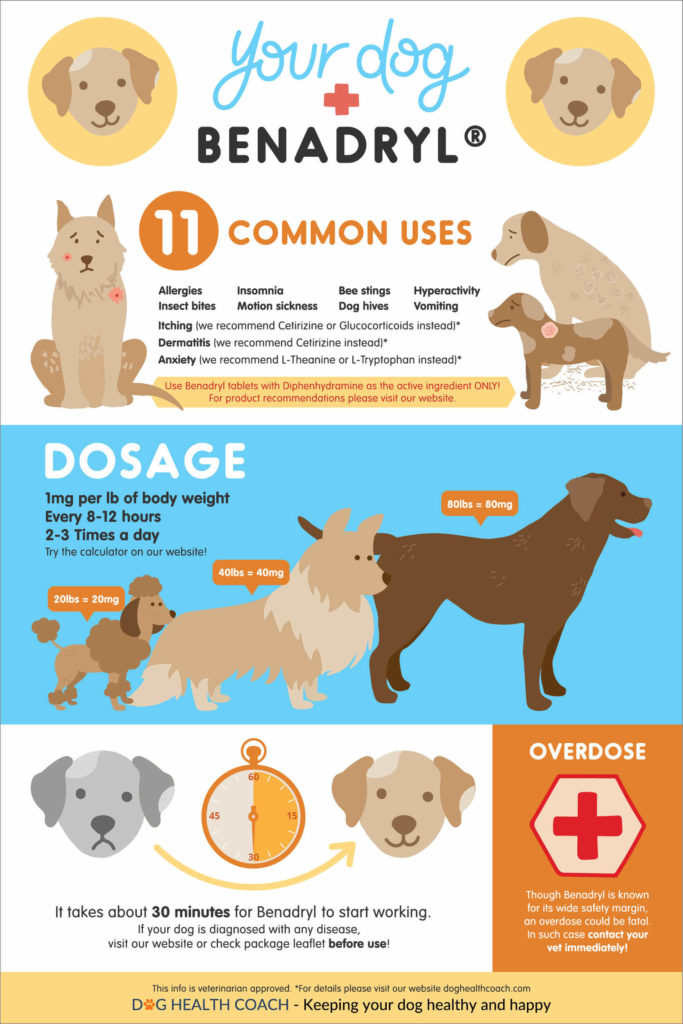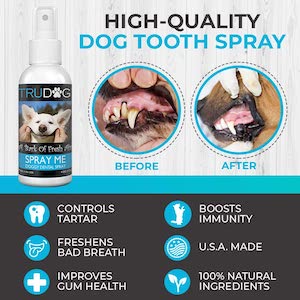Giving Benadryl to Dogs: What You Need To Know
Caring dog owners are always super cautious about what they let their dogs ingest, from the food they eat to the medicines they take. While you should never give your pup medication without advice from your vet, there are a few over-the-counter drugs for humans your canine may benefit from in certain instances. If you are looking for the correct dosage of Benadryl to give your dog, we found a great infographic from Dog Health Coach.

You may have heard of pooch parents giving their dogs Benadryl for seasonal allergies, or even to make them drowsy and stave off nausea on the occasional car ride. The most common question we get is “is it safe, and how will it affect my dog when I give them Benadryl?”.
We here at iHeartDogs got in touch with Dr. Michel Selmer, DVM, CTCVMP, to answer some questions for us. Also known as “The Caring Vet,” he offers traditional, holistic, integrative medical, surgical, and wellness care to his patients. He’s also the author of The Best of Both Worlds: An Advanced Guide to Integrative Veterinary Care for Happier, Healthier Pups, available on Amazon (digital copies are $2.99 and it’s free to Kindle Unlimited subscribers).
Again, you should always consult with your vet before administering any type of medication to your dog. Read the interview below to help you decide if an antihistamine is something your dog may benefit from.
iHeartDogs: Why would I want to give my dog Benadryl and how would it affect him?
Dr. Selmer: Benadryl is an antihistamine used primarily for prevention of motion sickness, as a sedative, for anti-nausea and for itchiness as a result of an allergic reaction (dogs with mast cell tumors, etc.). Benadryl inhibits histamine release, can cause sedation, help dry up mucus membranes, inhibit coughing and control nausea.
iHeartDogs: Is it safe to give my dog Benadryl? Any particular instances / conditions that make it unsafe?
Dr. Selmer: Generally speaking, Benadryl is safe… Benadryl would be contraindicated in dogs that have had an adverse side effect to Benadryl or any other antihistamine. Benadryl should also be used cautiously in dogs with glaucoma, difficulty urinating due to an enlarged prostate or obstructions at the neck of the bladder, vomiting due to an obstruction at the pylorus (between the stomach and duodenum), hyperthyroid disease, cardiovascular disease and/or high blood pressure (hypertension).
iHeartDogs: How much Benadryl should I give my dog?
Dr. Selmer: Your veterinarian will advise you on the dose of Benadryl if he/she believes your dog needs it.
(Note from iHD: New York State Law prohibits vets from diagnosing or prescribing meds to non-clients, so Dr. Selmer cannot give Benadryl dosing information in this post.)
However, for a general idea, WebMD advises:
“The standard dosage for oral Benadryl is 1 mg per pound of body weight, given 2-3 times a day. Most drug store diphenhydramine tablets are 25 mg, which is the size used for a 25 pound dog. Always double check the dosage before giving an over the counter medication.”

iHeartDogs: How long will Benadryl affect my dog?
Dr. Selmer: In dogs, the effects of Benadryl usually last 8 – 12 hours.
iHeartDogs: How will my dog act while under the effects of Benadryl?
Dr. Selmer: The most common side effects of Benadryl are lethargy, dry mouth and urine retention. Diarrhea, vomiting and decreased appetite are possible, but not common. There is no evidence that Benadryl will cause fear in dogs. Interestingly enough, there is evidence of excitement as a side effect in some cats.
A Side Note From Dr. Selmer:
Most people think to use Benadryl when their dog is having an allergic reaction. Benadryl will work best when given very early in the event of an allergic reaction, before histamine is released. Once a dog is symptomatic the histamine has already been released and Benadryl may not help.
Benadryl, or any other antihistamine, is best used in dogs with a predictable pattern of allergic exposure. For example, I will typically recommend an antihistamine (ie. Zyrtec, Benadryl, Atarax or Chlor-Trimeton) before the start of allergy season in a dog with seasonal allergies and to continue until allergy season is over.
I have not found antihistamines to be very good at controlling the itchy dog, as there are many things that can cause a dog to be itchy and histamine release is only one pathway. So, if Benadryl doesn’t work for an itchy dog after using it for 14 days I would recommend trying a different antihistamine.

Thank you to Dr. Selmer for taking the time to answer our questions. We hope this helps you understand more about giving Benadryl to your dogs.
Learn more about Dr. Selmer at www.TheCaringVet.com, and be sure to follow him on Facebook. You can also check out what he had to tell us about parvo in dogs.






